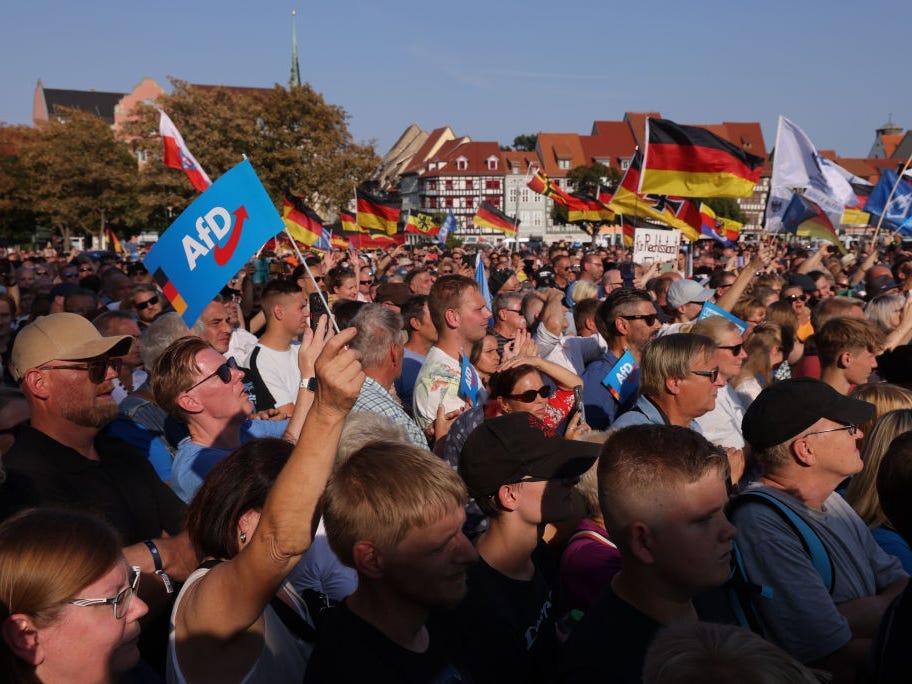-
In the eastern state of Thuringia, the Alternative for Germany (AfD) party won 32.8% of the votes.
-
It was the first far-right party to win a major election in Germany since the Nazis in 1938.
-
Chancellor Olaf Scholz asked other parties to exclude the party from coalitions, thereby blocking its power.
Germany’s anti-immigration policy Alternative for Germany Party (AfD) celebrated a historic election victory last weekend, giving the far right a boost in Europe’s largest economy.
According to preliminary results, the AfD won 32.8% of the vote in the German state of Thuringia, giving it a nine-point lead over the conservative CDU.
That makes it the first far-right party to win a major election in Germany since the Nazis in 1938.
AfD also came second in the neighboring state of Saxony. Security officials in both states consider the AfD to be “far right.”
German Chancellor Olaf Scholz called the outcome “bitter” and urged other major parties to exclude the far right from coalitions.
“The AfD is damaging Germany. It is weakening the economy, dividing society and ruining our country’s reputation,” he said in a statement to Reuters.
So far, other parties in the regional parliament have indicated that they do not want to join a coalition with the group.
But even though it is unlikely that they will come to power in Thuringia, German political expert Mark Allinson told BI that the AfD could still push for participation in national politics.
“As far as I know, it’s going to be impossible to elect a speaker of parliament without their consent,” said Allinson, a senior lecturer at the University of Bristol. “So there’s the potential for a stalemate.”
Scholz also issued a statement calling on regional parties not to form a coalition with the AfD. He said: “All democratic parties are now called upon to form stable governments without far-right politicians.”
Allinson told BI that the AfD could use this to its advantage. “The extremists will twist this as the other parties trying to block democracy,” he said.
Germany’s national elections will take place next September. The latest results are a blow to Scholz, raising questions about its future.
The AfD was founded in 2013. It started as a moderately conservative option in opposition to the Christian Democratic Union, but after 2015 it grew into a party that increasingly embraced nationalist and xenophobic ideologies.
The party also loudly rejects the idea that human activity has caused the climate crisis. AfD wants to prevent weapons from going from Germany to Ukraine.
In 2021, the German spy service placed the party under surveillance due to suspected extremismthe first time since World War II that a major political party has been scrutinized in this way.
The AfD leader of Thuringia, Bjorn Höckewas found guilty in 2023 and fined $13,900 for using a banned Nazi slogan during one of his speeches.
He appeared in court again in June of this year, accused of inciting crowds to complete the same banned phrase (“Alles für Deutschland”, or “Everything for Germany”) originally used by the Nazi Party’s paramilitary wing. He is appealing the decision.
The far right is gaining ground in some parts of Europe.
The European Parliament elections will be held in June saw far-right factions gain critical mass.
The Rassemblement National, France’s far-right bloc led by Marine Le-Pendefeated the French president’s centrist Renaissance party, receiving more than twice as many votes as his coalition.
Macron took a big gamble in June by calling parliamentary elections after the results of the European Parliament elections, which led to a surprise victory for the left.
In Italy, the far right has consolidated its power in the form of the Prime Minister Giorgia Meloni’s ultra-conservative Brothers of Italy, which became the governing party in 2022.
Read the original article at Company Insider

